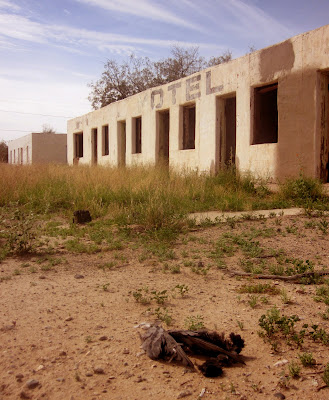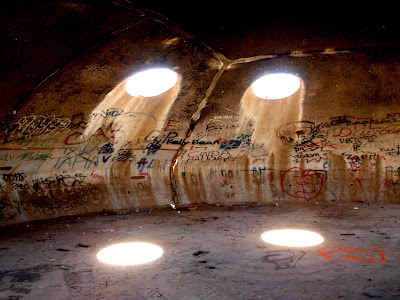Julie and I went back to the abandoned motel (above) used for one of the chapters in our Abandoned Places: Abandoned Memories (Desert Edition) book that has psychic reads and photographs of abandoned sites. It's changed a bit. The last time, there was a TV out front, now, a black bird with its head ripped off - welcoming, huh?
Here's the interior (below)
This particular abandoned motel (below) was quite the find, including empty pool, empty casitas, and boat.
This abandoned motel does not exist anymore (below), as it has been plowed under with the rest of the town off of I-10 north of Tucson in the Picacho Peak area.
This abandoned motor court (below) in Virginia was a wonder to explore, complete with skulls on the grounds and tons of nastiness.
When photographing abandoned places, I have tons of advice.
Safety
Of course, the most obvious is to be safe. Adhere to "no trespassing" signs. No need to get arrested or fined for your curiosity. The next is to be certain the place is empty before you enter. You do not want to ambush people who might be squatting and there are lots of squatters, some are down and out, some are dealing with drugs, and others might be here illegally and hiding out. So, let the building know you are approaching. I prefer to throw rocks at the building to scare anyone out. Better to deal with them where you can get free than to be cornered. Abandoned sites are crumbling, quite literally. They also often contain asbestos and other nasties like black mold. Carry a mask with you and gloves. Be sure your tetanus vaccine is up to date. Go in groups so some can be lookout while others photograph and in case someone falls through a floorboard, you have rescuers handy.
Photographing
Encroachment by nature/weathering: Abandoned sites have characteristics you want to enhance and showcase that other sites are not particularly as interesting. Abandoned sites are attacked by nature and aging, dried out wood, rusted metal, mold, moss, vines, fading, and the like.
Lighting: Abandoned buildings also have unusual lighting through cracks, broken glass, ceiling holes, and missing boards. I suggest you rarely use flash inside or you lose the mystery and the amazing effect of the light.
Irony/Poignancy: The element of irony in abandoned sites makes them a favorite of urban explorer (URBEX) folks. It is eerie to see things that people used to use that are now in nasty settings or perhaps out of place.
Perspective: Sometimes, taking a feature and blowing it out of proportion makes it seem even more eerie. Getting below a tall building and looking up can make it seem like it's sinister and looming. If something is wide, get on your belly, show just how elongated it is and pick up any crumbling remains on the ground.
Point of view: Point of view can cause a very poignant photograph. Consider putting yourself into the setting in a solemn way, utilizing what is reflected in a mirror, or through a window looking out from within instead of from outside to within.
In the case of the motels above, these places were once a fun place to stay but are now barren and deteriorated; a great perspective to utilize. Empty swimming pools, broken faded signs, a piece of furniture like a TV stand left inside, a row of rooms like stark gaping wounds are all features to play up.



Single item: Poignancy and isolation/loneliness are critical to get an abandoned site across photographically. Be certain to take advantage of a lone item -
These tips can be applied to any kind of photography of abandoned sites. Churches, homes, institutional buildings can all be prophetic to photograph, but in those cases, you will focus on what the building used to be and what it has become. For motels, it was once a getaway and vacation spot, but a home, a church, a hospital had different functions. Using these guidelines above - enjoy photographing abandoned sites and do so safely and never alone!
I'll close with some shots that were taken in a wide variety of abandoned sites -
Here's my video discussing this

































































